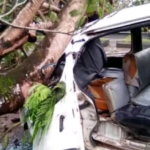By Flowerbudnews
The Cope and Live Mental Health Awareness Foundation, an NGO, has tasked the media to focus on increasing mental health challenges of Internally Displaced Persons (IDPs) within the country.
The Executive Director of the Foundation, Rev. Chukwudiebube Nwachukwu, made the call in Enugu on Wednesday while speaking with newsmen on the traumatising and negative memory flash-back experienced by IDPs.

Nwachukwu noted that media attention only turns to the latest breaking emergencies; while “little attention is paid to the longer-term mental health and psychological sickness plaguing persons who resettle as IDPs or refugees.”
According to him, in Nigeria, a decade of conflict and crisis caused by Boko Haram, other terrorist groups and natural disasters such as flooding in Maiduguri have affected millions of people and over two million remain displaced.
Nwachukwu, who is a mental health therapist and life coach, said that the majority of IDP’s settled in self-settled locations (Non-Government Authorized Sites) and with their host communities.
The executive director noted that the ever-increasing volume of forcibly displaced persons had stranded humanitarian agencies, services and host communities/states help-aids, particularly in healthcare services and food provision.

He said that approximately 33 per cent of displaced persons would pass through high rates of Post Traumatic Stress Disorder (PTSD); anxiety and depression.
He said, “Post Traumatic Stress Disorder (PTSD) entails having persistent and recurrent flashbacks of a witnessed traumatic experience.
“However, it is important to remember that stress-related to an IDP/refugee’s current situation can be just as difficult to deal with as those that lead to the flight in the first place.
“Anxiety simply means the presence of fear or apprehension that is out of proportion to the context of the life situation.
“It can vary from low to moderate levels of anxiety to more severe mental disorders; which include: fearful anticipation, palpitation (trembling), poor concentration, irritability, restlessness, headache, night terror, menstrual discomfort and failure of erection among others.”
The executive director noted that depression entails feeling sad or empty all day long or easily switching from a mood of happiness to sadness and feeling dejected.
Nwachukwu, who is physiologist, said that the consequences of unaddressed mental challenges among IDPs can have negative influences such as: substance abuse, rapid spread of diseases and infections.
“It can lead to sexual violence by the people who engage in warfare activities as well as those in authority in charge of IDP camps.
“There will be frequent deprivation of adequate food, shelter and health services among others.
“In PTSD, there will be changes in the person’s brain and pre-existing vulnerability and neurotoxicity as origin of brain volume reduction,” he said.
The expert recommended timely access to psychological/mental healthcare in terms of psychotherapy, counseling, relaxation therapy as well as behavioural and cognitive therapy.
“In severe cases, the authorities should ensure admission of such traumatised internally displaced person(s) into a psychiatric hospital for expert management,” he said.
The Cope and Live Mental Health Awareness Foundation is a global foundation on mental health whose major objectives includes: to educate the public on the effects of negative emotions on health and living; while providing mental health solutions and advocacy.
The foundation also supports confidential and private counseling, multi-sports activities leading to greater social interactions as well as shaping public advocacy, awareness and policy relating to women’s health and hygiene.











